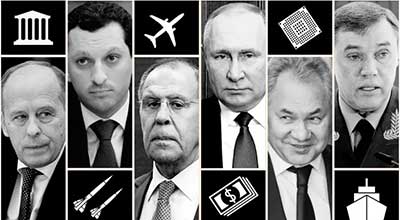Relevance: GS-2: Bilateral, Regional and Global Groupings and Agreements involving India and/or affecting India’s interests. Effect of Policies and Politics of Developed and Developing Countries on India’s interests, Indian Diaspora.
Key Phrases: Sanction, Swift global payments system, Globalism, Financial manipulations, A system of licencing, Inflationary pressures, Foreign exchange reserves, Great Game.
Why in News?
- A shift is taking place in the business of global dominance and hegemony, from the model of expressing force through troop presence to financial sanctions. It is led by the US and has become recently visible in the US and EU sanctions on Russia.
- The US, UK and EU have adopted sanctions aimed at freezing the assets of President Vladimir Putin and his foreign minister, Sergei Lavrov, in response to the war in Ukraine. They also plan to place sanctions on the Russian central bank and remove some of the country’s lenders from the Swift global payments system, in addition to other economic sanctions. Other allies, including Japan, Canada, Australia and South Korea, have also adopted sanctions.
Economic rivalry leading to military confrontation:
- From rule-bound globalism, there is a move to an understanding of
the management of individual economies, bound together by multiple networks
of investment and trade.
- This is a global economy of individual rivalries between countries and corporations, continually shifting alliances, and contingencies overtaking assumed structural certainties.
- It demonstrates the emergence of an intensive rivalry among individual countries, exposing their red lines with the potential to turn into a military confrontation — the Uyghurs and Taiwan for China; the US presence in the Pacific; Ukraine for Russia, the latter already militarised.
How sanctions work:
- Sanctions are designed by the government and implemented by both profit-making and non-profit private enterprises, domestic and international NGOs (including the United Nations).
- Due to globalization, every country and corporation are bound together by multiple networks of investment and trade.
- Who are the beneficiaries? The US policy of using economic tools for realising foreign policy and overall national security objectives prioritises the private sector.
A case study of Afghanistan and sanctions by US:
- In Afghanistan, financial manipulations from afar in the form
of sanctions may result in subjecting trading activities and investment
ventures to the approval of the US Treasury through a system of
licencing.
- This may give the US a say in who trades with whom and what to trade etc.
- Confiscation of foreign exchange reserves: Another way of exerting control from afar. Following the withdrawal of the American troops on August 15, the US froze Afghanistan’s foreign exchange reserves of $7 billion deposited in the New York Federal Bank.
Escaping from sanctions:
- China has found ways of working with or around US sanctions in several countries, including Iran. Taliban views China as its economic lifeline to rebuild the country
- Banning Russia from the SWIFT system of international payments is
a problem for the global financial system. The Russian economy is more
isolated, protected and less reliant on international funding than was the
Afghan economy.
- So far, the possible impact of sanctions on Russia is estimated at a 1 percent loss in GDP.
China and Russia, in concert, may provide a way out of the sanctions regime.
Implication and issues of sanctions:
- An opportunity to China: Sanctions offers economic lever to China in its dealings with the Taliban in its dealings with the Taliban, to the Chinese state-owned enterprises and private corporations with an opportunity to invest in Afghanistan’s infrastructure, linking it to the Belt and Road project, and in its rich mineral resources of copper, cobalt, and lithium.
- Concerns for India: China could also use this as an opportunity to unite investments in Afghanistan and Pakistan, isolating India.
- Recasting of power configurations: Russian military and political escalation to re-institute control over former Soviet regions, including Ukraine, Belarus, and Kazakhstan, and the rapprochement between China and Russia against the West, may open up new possibilities for China in Middle Eurasia.
- Misuse of sanctions for personal gain: The Taliban demanded the unfreezing of the funds by the US, much-needed in Afghanistan where, according to the UN, more than half of the population is under threat of starvation. On February 11 came the shocking news that the Biden administration will split the funds between compensation for 9/11 victims and humanitarian aid for the Afghans.
- More loss than gain: The impact of any disruption in Russian exports of oil, gas, palladium, wheat and fertiliser at a time when those prices are barely recovering from inflationary pressures caused by Covid-19 disruptions, is likely to offset any leverage the Western sanctions may hope to gain.
- Peace uncertainty in future: By supporting Russia, Beijing is suspending its long-held position of no interference in the internal affairs of individual countries, inviting plentiful speculation about whether Putin’s move in different Eurasian regions could provide Xi with a precedent in Taiwan.
Conclusion:
- A new global Great Game is unfolding before our eyes with China, confident in its global economic powers, busily manipulating its own public opinion via Weibo to ensure that the right lessons – which confirm the rights of old empires over various populations – are drawn from the Ukraine incident.
- In the new game, the Western alliance led by the US seems lost in a maze of sanctions, largely ineffective in a global economy, the control of which is eluding its grip.
Sources: Indian Express Financial Times
Mains Question:
Q. Can Russia’s sanctions pain be China’s gain? Explain the issues with sanctions as how it is becoming ineffective in the current globalized world. [250 words].






















